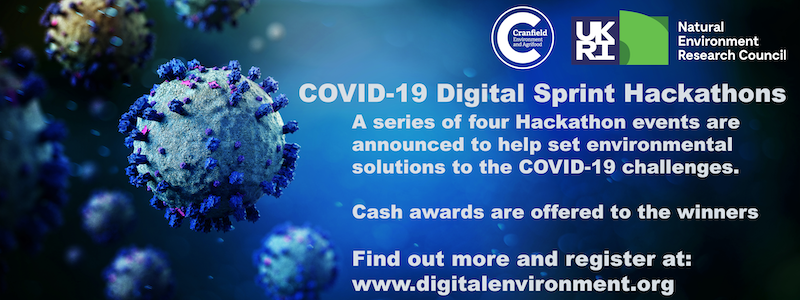The COVID-19 pandemic is leading to profound changes in society, with consequent worldwide environmental impacts, positive and negative. As we seek to understand fully the consequences of these impacts, there is a pressing need for tools and solutions to help us characterise and understand what has happened. The development and sharing of these through the Hackathons will aid our ability to determine the possibility of resurgence from a residual population of the virus, and to see how future pandemics can be planned for and better mitigated. The pandemic presents a unique opportunity by which to see the impact society normally exerts on the environment, and as we move towards a planned net carbon zero future there are also opportunities to understand how best we may reconfigure our activities to achieve this.
An exciting development for the Digital Environment programme then is the announcement of a ‘Digital Sprint’ comprising a series of key interlinked event milestones, interspersed by regular briefing meetings held with senior management in UKRI/NERC. Commencing from June 1st, the principle events comprise:
Ideathon – this event gathers together key stakeholders and thought leaders in the area of the environmental impacts of COVID-19. Convened by Cranfield and hosted by NERC, this event will help identify the thematic focus areas for the following hackathons.
Hackathon One, Air Quality – This event will address the following challenges: Is there a correlation between air quality and incidence and severity of COVID-19 infection? What is the air quality threshold we need to meet to improve individual outcomes?
Hackathon Two, Recovery – This event will address the following challenges: What are the positive and negative aspects of lockdown and recovery measures on meeting Paris and net zero targets? Using multivariate signals to highlight these impacts and their inter-relationships to inform decision making.
Hackathon Three, Ecosystem services – This event will address the following challenges: Can we understand whether/how a healthy natural environment modulates the spread of COVID-19? And whether changed human behaviours are having an impact on this? Can we use this insight to improve health outcomes? Evidence-based support for decision-makers and individuals to mitigate their environmental impact and reduce their personal health risk.
Kaggle Challenge – Visualising risk – This event in Kaggle (https://www.kaggle.com) will address the following challenges: Solutions will turn data into actionable information. Developing unique and novel ways of communicating risk-based COVID-19 data for environmental solutions.
Outcomes of the Digital Sprint project will be documented on the Cranfield/NERC website https://digitalenvironment.org
